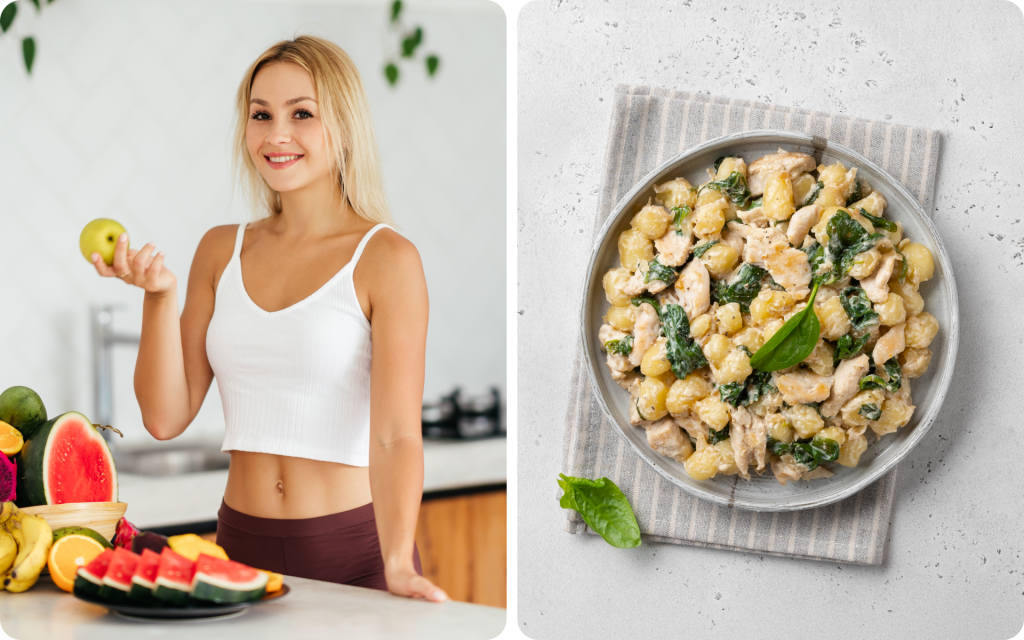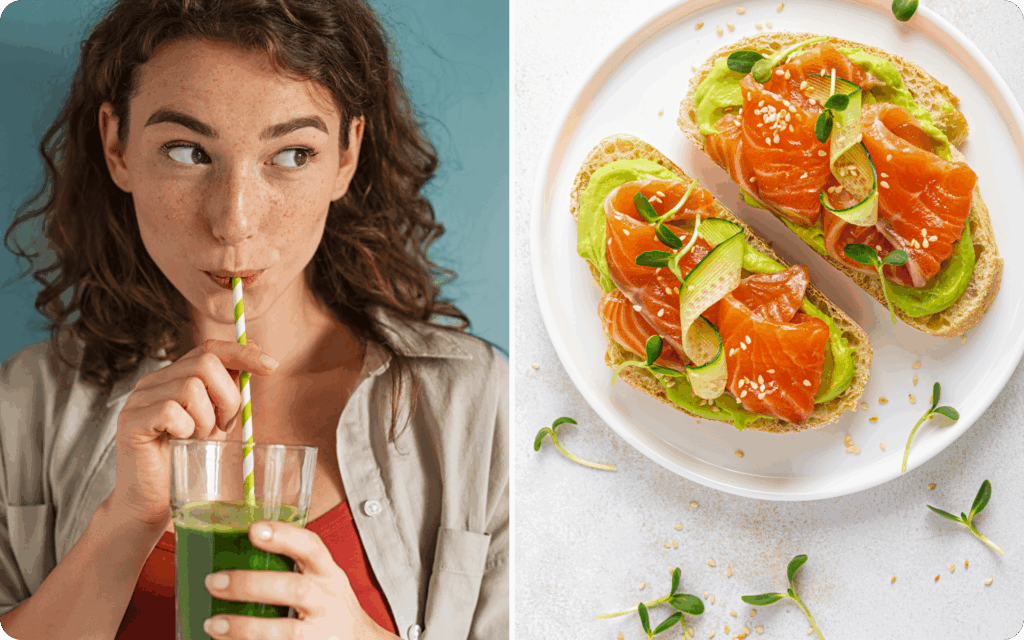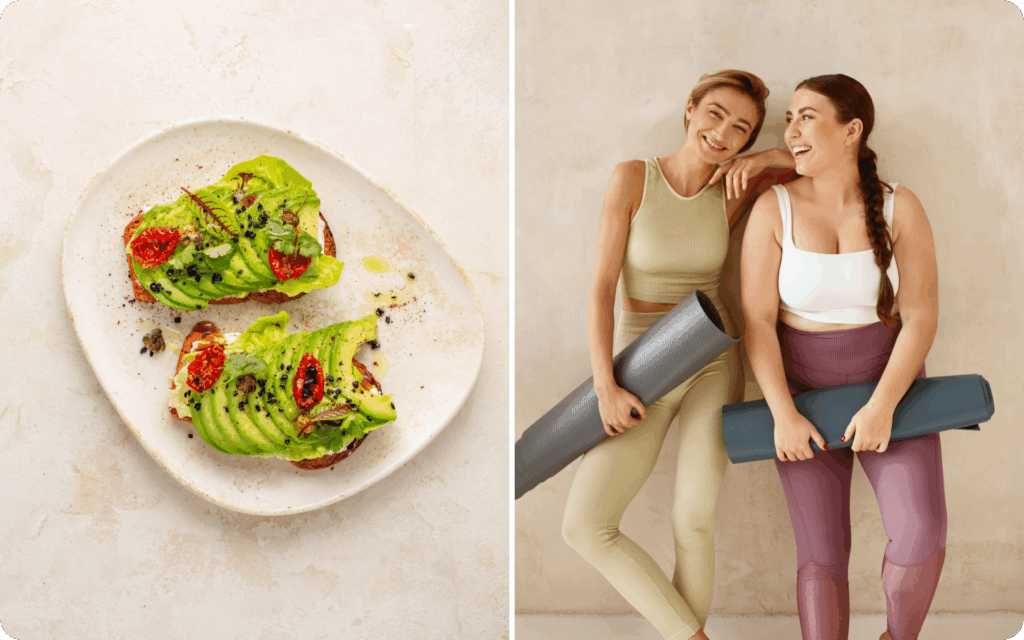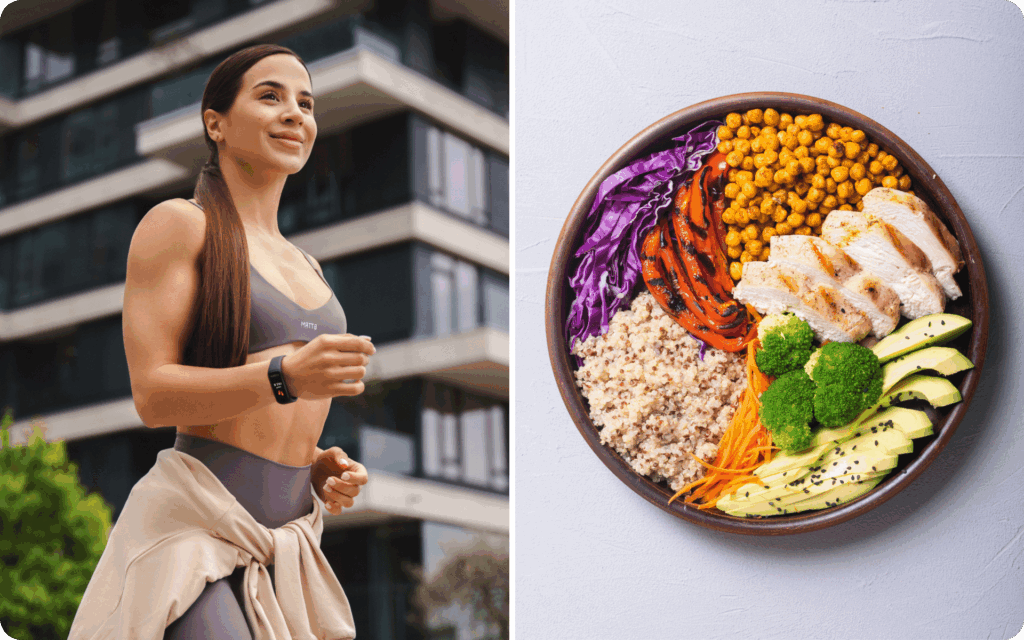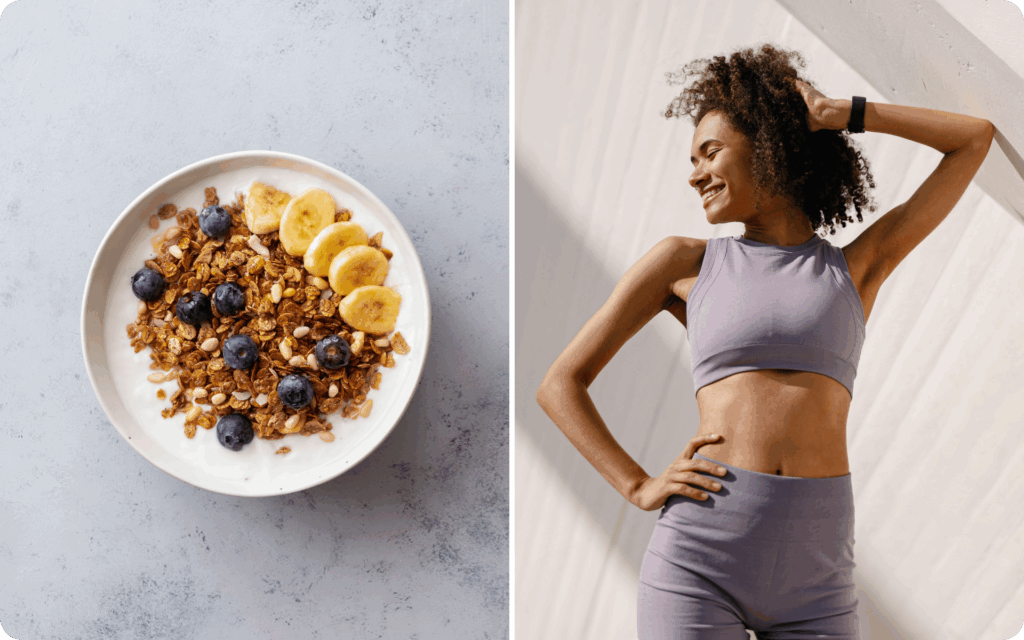Whatever you’re using fasting for, it’s great to consult a professional before you integrate time-restricted eating into your life.
Basically, many individuals use fasting for weight-loss goals. And yes, eating during certain time frames and losing weight sounds appealing, but the quality of your food is as important as calorie restriction.
You should fuel your body right. Nourishing yourself with healthy components positively affects your weight and improves your wellness.
It applies to the quality, rather than quantity. If your diet consists only of highly processed and high-calorie meals during your eating windows, you’re less likely to get any benefits. Losing weight is about making balanced meal options that affect how you feel and function daily.
Here, we’ve rounded up what to eat and avoid before fasting, and how to prepare your body for time-restricted eating.
How Can I Prepare My Body for Fasting?
Picture this: you’ve chosen the easiest form of fasting to comply with, but how do you prepare for a fast? The following steps will help you smoothly dive into the structured fasting routine without any consequences.
These strategies also make it easier to handle the notorious post-fast hunger.
- Talk to your healthcare provider to make sure it’s 100% right for you
- Prepare for possible changes in your body after fasting
- Adjust your diet gradually
- Drink lots of fluids
- Pick the right pre-fast meals
- Recharge and relax
- Monitor your well-being and physical changes
Talk to your healthcare provider to make sure it’s 100% right for you
Talk to a trusted doctor before fasting, particularly if you have a medical condition, are taking medication, or have any other concerns. Children under the age of 18, people with insulin-dependent diabetes, women who are pregnant or breastfeeding, and those with a history of eating disorders should also refrain from intermittent fasting (1).
One more thing you should keep in mind: your doctor may recommend a monitoring or check-in plan to make sure you’re tolerating intermittent fasting without any negative effects on your health.
The BetterMe: Health Coaching app will provide you with a host of fat-frying fitness routines that’ll scare the extra pounds away and turn your body into a masterpiece! Get your life moving in the right direction with BetterMe!
Prepare for the possible changes in your body after fasting
No sugarcoating things at this point: fasting isn’t all the benefits – there are also drawbacks. A study published in 2023 found that possible intermittent fasting side effects include headaches, mood swings, lethargy, and dizziness (2).
If you’re experiencing side effects, it may make sense to reduce the intensity of your workouts and relax more. Calorie reduction may already impact your body, and adding more intensive exercises can amplify these effects. Dive deeper into the intermittent fasting guide with our dedicated article.
Adjust your diet gradually
Cut back on ultra-processed foods and added sugar a few days before fasting. Replace them with whole grains, fruits, vegetables, and lean proteins to stabilize your energy levels and blood sugar.
However, you shouldn’t completely eliminate ultra-processed foods and added sugar, you should just reduce the intake. If you suddenly stop eating your favorite foods, this can cause real cravings for them later.
Drink lots of fluids
Drink enough fluids consistently during both fasting and eating periods. Adding water-rich fruits and vegetables, such as watermelon, cucumber, and oranges, could also help do the job for you.
Doing this during the pre-fasting period may help your body stay hydrated and prepare it for being on just liquid for a while. It will make the transition smoother, reducing the potential discomfort from dehydration.
Pick the right pre-fast meals
Enjoy nutrient-dense meals before your fasting window. The best foods for fasting are balanced meals that are made up of complex carbs, lean proteins, and healthy fats.
They help you stay full for longer, alleviating any cravings while you fast. All the healthy options that pop into your mind, such as lean meats, eggs, vegetables, legumes, and whole grains, are your true eating pals. If you’re curious how to prepare for a fast, check out our earlier article.
Recharge and relax
A well-rested body copes with fasting more easily. Sleep enough: try to turn in and wake up at the same time daily, if possible. Mild stretching before bed is another great way to fall asleep faster.
Stretching before bedtime may help manage or reduce stress, improve posture, decrease muscle stiffness, and promote circulation (3).
Monitor your well-being and physical changes
Keeping track on the phone or using a paper diary could help you objectively evaluate your journey. Describe each of your fasting days: your feelings, side effects, and the food you’re eating before you fast.
You’ll see how your body changes and processes the change – it will help you stay focused on your main goals. Fasting goals motivate you to keep going, while your notes serve as a simple guide to understand how fasting impacts your body and mind.
Read more: 12-Hour Fasting Schedule For Better Physique — A Look At Belly Fat Reduction
What Is the Best Thing to Eat Before Fasting?
Many good foods to eat before a fast are open to you. At the start of this review, you will have read that choosing nourishing foods can make a great difference to how you’ll feel during the fasting period.
Here’s a short recap – fill your plate with:
- Complex carbs: real winners because your body digests them slowly, supplying a slower release of glucose into the bloodstream (4). Examples of complex carbs are legumes, fruits, vegetables, and whole-grain products.
- Healthy fats: Replacing saturated fats with healthy fats can help lower the risk of heart disease, lower blood pressure, lower bad LDL cholesterol levels, and prevent abnormal heart rhythms (5). Spruce up your plate with avocados, nuts in salads, olive oil, and seeds. Fancy something sweet? Spread some peanut butter on the toast and sprinkle with crushed nuts or seeds.
- Proteins: Your body needs protein to grow and repair cells and work properly overall. This component is essential for supporting muscle mass as you age and keeping you satiated, which is particularly beneficial during fasting (6). Eggs, Greek yogurt, chicken, and fish can complement your meals with exquisite taste and nutrition.
- Fiber: Another primary component for satiety and energy, fiber is a real food hit. It’s one of those components that offers many benefits: a decreased risk of heart stroke, type 2 diabetes, and bowel cancer. Fiber aids digestion and prevents constipation (7). Think of whole grains, legumes, fruits (berries, apples, and pears), vegetables (broccoli, sweet potatoes, and Brussels sprouts), nuts, and seeds.
Listen to your body – add a variety of recipes to your beginner fasting schedule. Most of them require zero to few fancy ingredients. Look for something delicious and satiating. Finally, don’t force yourself to eat foods you dislike, as this will make your fasting unbearable and unsustainable. For more details about the beginner fasting schedule, take a look at our prior publication.
What to Eat Before a 16-Hour Fast
You’ve heard of different time-restricted fasting schedules. 12-hour and 16-hour fasts are the most popular choices among people. So, what should you eat before fasting for 12 hours or 16 hours?
It’s simple. You need to eat the foods mentioned in the section above: healthy fats, complex carbs, proteins, and fiber. Here, you’re going to unlock step-by-step recipes for the top meals to enjoy before a 16-hour fast – they can also be used for other fasting regimes too.
Check out this simple one-day meal plan to try before a 16-hour fast:
Breakfast: A Satiating Bowl
Ingredients:
- 2 teaspoons olive oil
- 1/2 cup potatoes
- 2 cups spinach
- 1/2 cup halved cherry or grape tomatoes
- 1/4 avocado, sliced
- 1 to 2 eggs (fried, scrambled, soft-boiled, whatever your preference)
- 1 small clove of garlic, minced
- Fresh herbs such as parsley, chives, or basil, if desired
- Sea salt and freshly ground black pepper, to taste
- Sprinkle of feta cheese or nutritional yeast, optional
- Salsa or hot sauce is optional
How to prepare:
- In a small skillet, heat the olive oil over medium heat.
- Add the garlic and cook for 30 seconds. Add the spinach and tomatoes and cook for 2 to 3 minutes, stirring often, until softened.
- Cook the eggs to your desired preference.
- Combine the potatoes, spinach, avocado, tomatoes, and eggs in a bowl.
- Season with salt and black pepper to taste.
- Garnish with feta cheese, if you’re using this.
- Serve warm with a few dashes of hot sauce, if desired.
| Calories | Fats | Protein | Fiber | Carbs |
|---|---|---|---|---|
| 272 kcal | 15 grams | 10 grams | 6 grams | 17 grams (8) |
Lunch: Honey Mustard Salmon with Mango Quinoa
Ingredients:
- 1 (8 oz) fresh or frozen skinless salmon fillet
- 2 teaspoons honey
- ½ cup chopped fresh or frozen mango, thawed if frozen
- 1 large clove of garlic, minced
- ⅔ cup cooked quinoa, room temperature
- 1 teaspoon olive oil
- ⅛ teaspoon salt
- 2 teaspoons spicy brown mustard
- 1 to 2 tablespoons seeded and finely chopped fresh jalapeño pepper
- 1 tablespoon sliced almonds, toasted
- Pinch of ground black pepper
- 2 tablespoons chopped fresh cilantro
How to prepare:
- Thaw the salmon if it’s frozen. Rinse the fish and pat it dry with paper towels.
- In a small bowl, mix the honey, mustard, and garlic.
- Brush both sides of the salmon with the honey mixture. For a charcoal grill, place the salmon on the grill rack over medium heat.
- Cover and grill for 4 to 6 minutes per 1/2-inch thickness of fish until the salmon starts to flake.
- Stir the quinoa, mango, jalapeño pepper, almonds, olive oil, salt, and black pepper in a medium bowl.
- Top with fresh cilantro.
- Serve the salmon with quinoa.
This recipe makes 2 servings.
| Calories | Fats | Protein | Fiber | Carbs |
|---|---|---|---|---|
| 326 kcal | 12 grams | 26 grams | 3 grams | 27 grams (9) |
Snack: Nut and Berry Parfait
Ingredients:
- 1 cup nonfat plain Greek yogurt
- ¼ cup sliced almonds, toasted if desired
- ¼ cup fresh or frozen raspberries
- ¼ cup fresh or frozen blueberries
- 2 teaspoons honey
Short Preparation:
Layer the yogurt, berries, and almonds in a bowl or jar. Drizzle the honey on top.
| Calories | Fats | Protein | Fiber | Carbs |
|---|---|---|---|---|
| 378 kcal | 15 grams | 30 grams | 7 grams | 35 grams (10) |
What Not to Eat Before Fasting
Are you wondering about what foods to avoid while intermittent fasting? Check out the meals you should avoid before fasting.
- Sugary foods and beverages: Consuming too much added sugar may increase the risk of heart disease, stroke, and heart failure. Too much sugar may also negatively impact your joint health, brain, and liver. In addition, it can increase your weight (11). Sweet examples are candies, chocolates, cookies, sodas, fizzy drinks, and juices.
- Fried and high-fat foods: When such foods are eaten too often, they may contribute to weight gain and increase the risk of obesity and heart disease (12). Examples include junk foods, such as burgers and French fries, and fried meats.
- High-sodium foods: These include canned soups, chips, pizza, deli meats, pre-packaged snacks, soy sauce, bacon, sauces and spreads, baking soda, baking powder, and table salt. Too much sodium may increase your risk of heart disease and stroke by raising your blood pressure (13).
- Alcohol: This adds calories and may also hinder your fasting process. For example, heavy alcohol use can lead to digestive problems and weaken your immune system, which increases your vulnerability to negative effects while practicing intermittent fasting (14).
Read more: Intermittent Fasting Diet Plans: How to Choose One That Works for You
Can I Drink Lemon Water While Fasting?
Yes, drinking lemon water while fasting is allowed as long as it’s not sweetened with added sugar. It won’t break your fast, but it will jazz up the flavor. Lemon water offers a wide range of benefits: it helps with digestion, keeps you hydrated, prevents kidney stones, promotes weight loss, and provides an antioxidant boost (15).
This refreshing addition to your daily routine perfectly pairs with fasting windows.
What to Avoid Doing When Fasting
Some things you should steer clear of during fasting have already been mentioned. To sum them all up, there are four pitfalls to watch out for:
- Overexerting yourself with intense workouts. Stick to gentler activity sessions, such as brisk walking or yoga.
- Dehydration. Failing to drink enough fluids can cause dizziness, fatigue, and headaches.
- Indulging in great amounts of food immediately after fasting. Consuming large amounts may upset your digestion and demolish the fasting benefits.
- Poor sleep and too much stress. Not sleeping enough and being constantly stressed out may interfere with your body’s ability to adapt and recover during fasting.
The secret power of fasting entails giving the body a reset – some people believe that this boosts energy and mental clarity and improves overall health. From a religious perspective, fasting fosters spiritual growth, which helps you reconnect with God, while from a health perspective, it can lead to consuming fewer calories overall, which promotes weight loss. If you’re afraid of crashing when fasting, you should focus on these simple strategies for inner power: stay hydrated, eat balanced pre-fasting meals, and avoid ultra-processed foods and alcohol. Salt itself won’t break a fast, but if salty foods or electrolyte drinks also contain calories from sugar or other nutrients, they may break your fast. No, black unsweetened coffee doesn’t break a fast as it’s virtually calorie-free. You can enjoy it, but in moderation, as long as it doesn’t interfere with your sleep quality.Frequently Asked Questions
What is the secret power of fasting?
How to not crash when fasting?
Why no salt during fasting?
Does black coffee break a fast?
The Bottom Line
Fuel your body right: the best foods to eat before fasting. The foods you should eat are complex carbs, healthy fats, protein, and fiber.
It’s recommended to consume satiating meals before fasting to stay satisfied for longer. Before fasting, avoid high-sodium, sugary and fried foods, and alcohol. During fasting, focus on gentler exercises, stay hydrated, sleep well, and keep stress under control.
DISCLAIMER:
This article is intended for general informational purposes only and does not serve to address individual circumstances. It is not a substitute for professional advice or help and should not be relied on for making any kind of decision-making. Any action taken as a direct or indirect result of the information in this article is entirely at your own risk and is your sole responsibility.
BetterMe, its content staff, and its medical advisors accept no responsibility for inaccuracies, errors, misstatements, inconsistencies, or omissions and specifically disclaim any liability, loss or risk, personal, professional or otherwise, which may be incurred as a consequence, directly or indirectly, of the use and/or application of any content.
You should always seek the advice of your physician or other qualified health provider with any questions you may have regarding a medical condition or your specific situation. Never disregard professional medical advice or delay seeking it because of BetterMe content. If you suspect or think you may have a medical emergency, call your doctor.
SOURCES:
- Intermittent Fasting: What is it, and how does it work? (n.d., hopkinsmedicine.org)
- Intermittent Fasting: Benefits, Side Effects, Quality of Life, and Knowledge of the Saudi Population (2023, pmc.ncbi.nlm.nih.gov)
- Top 10 Benefits of Stretching (2024, acefitness.org)
- Carbohydrates (2023, heart.org)
- Choosing Healthy Fats (n.d., helpguide.org)
- Protein (n.d., betterhealth.vic.gov.au)
- How to get more fibre into your diet (2022, nhs.uk)
- Savory Breakfast Bowl (2024, twopeasandtheirpod.com)
- Honey Mustard Salmon with Mango Quinoa (2019, eatingwell.com)
- Nut & Berry Parfait (2024, eatingwell.com)
- How Does Too Much Sugar Affect Your Body? (2024, webmd.com)
- Why Are Fried Foods So Bad for You? (2025, health.clevelandclinic.org)
- About Sodium and Health (2024, cdc.gov)
- Alcohol Use and Your Health (2025, cdc.gov)
- Is Starting Your Day With Lemon Water Healthy? (2024, clevelandclinic.org)

